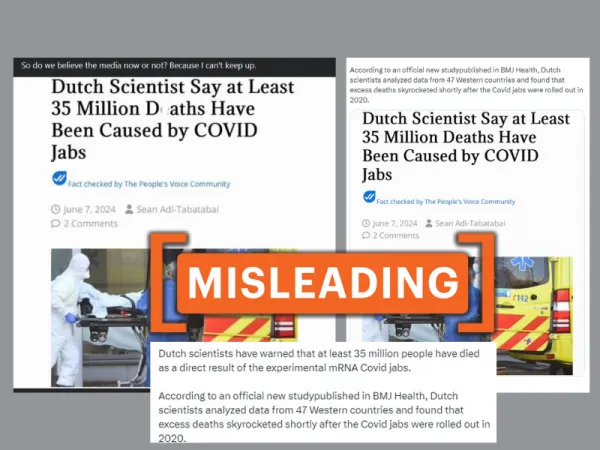By: Vanita Ganesh
June 14 2024
 Screenshots of posts sharing the article that claims a link between excess deaths and the COVID-19 vaccine. (Source: Facebook/ Modified by Logically Facts)
Screenshots of posts sharing the article that claims a link between excess deaths and the COVID-19 vaccine. (Source: Facebook/ Modified by Logically Facts)
The claim has emerged from an article published by The People's Voice, which is known for spreading misinformation and misleading claims.
What is the claim?
Users on social media have shared a screenshot of an article with the headline: "Dutch Scientists Say at Least 35 Million Deaths Have Been Caused by COVID Jabs." The screenshot has been shared on social media with captions like, "So do we believe the media now or not? Because I can't keep up." An archived version of the article can be viewed here, and posts making the same claim are archived here, here and here.
Posts claiming Dutch scientists have said that 35 million deaths have been caused by the COVID-19 vaccines. (Source: Facebook/Modified by Logically Facts)
However, the claims made in the post are misleading.
What we found
The article, published on June 7, is from a website called The People's Voice, which has a history of spreading misinformation. Logically Facts has previously fact-checked claims published by The People's Voice, which can be read here, here, and here.
The article cites a study - titled "Excess mortality across countries in the Western World since the COVID-19 pandemic: 'Our World in Data' estimates of January 2020 to December 2022" - published in the British Medical Journal to claim that data analyzed from 47 Western countries by Dutch scientists proved that "excess deaths skyrocketed shortly after the Covid jabs were rolled out in 2020."
Published on June 3, 2024, the study by four researchers - Saskia Mostert, Marcel Hoogland, Minke Huibers, and Gertjan Kaspers - looked at mortality data in 47 Western countries between January 2020 and December 2022 to ascertain the number of excess deaths recorded during that period.
Using data from the 'Our World in Data' database, the study found that excess mortality was documented in 41 countries (87 percent) in 2020, 42 countries (89 percent) in 2021, and 43 countries (91 percent) in 2022.
What does the study say?
According to the study, the greatest number of "excess deaths" - 1,256,942 - was recorded in 2021, the year that containment strategies and COVID-19 vaccinations were used to fight the spread of the virus. It also says that 808,392 extra deaths in 2022 were reported when most containment restrictions were dropped and COVID-19 vaccinations continued.
The study defines "excess mortality" as a discrepancy between the reported number of deaths during a specific timeframe and the expected number of deaths for that timeframe in a normal situation. The paper goes on to acknowledge that excess mortality during a crisis can point to "a more extensive underlying burden of disease, disablement (sic) and human suffering."
The paper also acknowledges factors like limited access to healthcare and food or the shortage of staff added to the limited delivery of medical services could have contributed to the excess death numbers. The study also says that, while there are significant limitations to contend with, "cause-specific mortality data therefore need to be made available."
Contrary to the claim made online, the study does not establish a conclusive link between the excess deaths and the COVID-19 vaccine but rather examines trends in excess mortality for 47 Western nations. The claims around excess deaths being linked to the vaccine roll-out ascribed to the BMJ article are misleading.
The British Medical Journal also issued a statement on June 6 (archived here), saying media outlets "misreported" the study. The statement said that while the study recognized links between preventative measures and side effects, it did not recognize any causal link between the COVID-19 vaccines and mortality. The statement also iterates that the study looks at trends in excess mortality over time and not its causes.
Princess Máxima Centrum, a Dutch hospital affiliated with the study, and one of the researchers, Saskia Mostert, also issued a statement on June 11 (archived here) distancing itself from the research. The hospital said it was investigating the circumstances of the publication. "The Princess Máxima Center deeply regrets that this publication may give the impression that the importance of vaccinations is being questioned … If it turns out that carelessness was involved in the realization of this publication, it will of course be withdrawn," the hospital said. According to the research paper, Saskia Mostert works with the hospital's Pediatric Oncology department.
The People's Voice article also cited a Telegraph article (archived here) published on June 5 to imply that the COVID-19 vaccine "may have helped fuel a rise in excess deaths." Logically Facts has previously debunked the Telegraph's article.
It is to be noted that the World Health Organization, as well as studies, have maintained that while vaccines cannot prevent COVID-19, they reduce the severity of the symptoms significantly and provide strong protection against severe disease, hospitalization, and death.
The verdict
An article from The People's Voice falsely claims that Dutch scientists have linked the deaths of at least 35 million people to COVID vaccines. The study does not draw this definitive link and has been shared with a misleading narrative.
The COVID-19 pandemic has given rise to a lot of potentially dangerous misinformation. For reliable advice on COVID-19, including symptoms, prevention, and available treatment, please refer to the World Health Organization or your national healthcare authority.